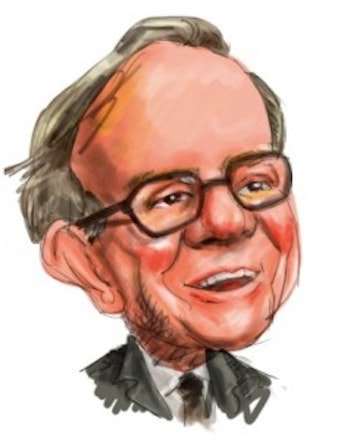
Hedge fund manager Cliff Asness, who runs AQR Capital Management, published an op-ed in the Wall Street Journal taking on Warren Buffett’s argument that tax rates don’t really matter. First, here’s the piece from Buffett’s Nov. 25th New York Times’ op-ed Asness is referring to: Suppose that an investor you admire and trust comes to you with an investment idea. “This is a good one,” he says enthusiastically. “I’m in it, and I think you should be, too.”
Solving the Buffett Problem: Except There Isn’t A Buffett Problem (Forbes)
One of the standard tropes about taxation at present is that there’s this “Buffett Problem”. That there is some problem about the way that Warren Buffett is taxed and it’s a problem that we must do something about. The actual problem as I see it is that there is no Buffett problem and thus there’s not something that we need to find a solution to. …As you can see, here we’ve got two influential and highly respected (and rather better at it than I am) financial journalists pondering the Buffett problem. Which is that Warren Buffett pays a lower tax rate than his secretary.
Warren Buffett seeks to revive newspaper industry (LehighvalleyLive)
Warren Buffett, the investor famous for betting on aging industries like railroads and insurance, is now trying to pull off something other billionaires have tried and failed to do: save the newspaper business. His company, Berkshire Hathaway Inc. (NYSE:BRK.A), has spent more than $342 million on 80 newspapers — including its hometown paper, the Omaha World-Herald — and used them to build a new business unit. And Buffett isn’t done. Though the division announced plans to close an underperforming newspaper in Virginia last month, he’s said that more acquisitions may be in store.
About Utah: RC Willey growing but holds to roots (DeseretNews)
It’s been more than 17 years now since RC Willey, the home-furnishings chain that started on the edge of a cornfield in Syracuse, went all Wall Street on us and sold out to Warren Buffett’s investment company, Berkshire Hathaway. Since that time, RC Willey has expanded beyond Utah’s borders, opening a store in Boise, two in Las Vegas, another in Reno and still another, the biggest yet in the chain, in Sacramento, Calif. Next year it plans to open another giant store in Utah, just west of IKEA in Draper. Its employee force has grown to 2,400.
Helping Buffett Crack the Indian Market (WSJ)
India may prove a tough nut to crack for Warren Buffett. His maiden Indian venture—an online insurance distributor called Berkshireinsurance.com—made a big splash when it launched in March 2011. The company, which sells Bajaj Allianz General’s non-life-insurance products, wants to be among the top three companies in India selling insurance on the Internet in the next three to five years. But even with a name like Mr. Buffett’s behind it, that’s a lofty goal for a newcomer to India’s $40 billion insurance industry. The company sold 300 policies within days by offering invitation to a talk the insurance mogul was giving in New Delhi. But that pace has slackened since. The company hasn’t yet turned a profit and is banking on keeping a tight leash on expenditures and relying on the word-of-mouth publicity to build brand recognition, says Arun Balakrishnan, the company’s chief executive.
13 Lessons Warren Buffett Learned About How To Achieve Success (BusinessInsider)
With his unique stock-picking skills, self-made billionaire Warren Buffett is regarded as one of the most brilliant investors today. But Buffett’s success comes mostly from his ability to believe in his own skills and refusal to follow the crowd. Jamie Downey at Boston.com reports that Buffett “will only invest in companies that meet [certain] criteria. He does not feel pressured when things do not go his way nor when outside sources suggest new rules for investing.”
Yamana Gold Becomes Oversold (Forbes)
Legendary investor Warren Buffett advises to be fearful when others are greedy, and be greedy when others are fearful. One way we can try to measure the level of fear in a given stock is through a technical analysis indicator called the Relative Strength Index, or RSI, which measures momentum on a scale of zero to 100. A stock is considered to be oversold if the RSI reading falls below 30. In trading on Monday, shares of Yamana Gold Inc. (TSE:YRI) entered into oversold territory, hitting an RSI reading of 28.6, after changing hands as low as $16.86 per share.





